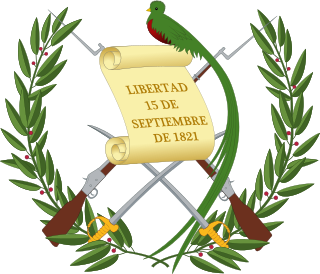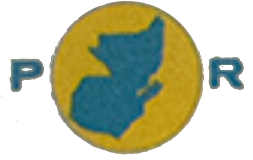
The Guatemalan National Revolutionary Unity is a Guatemalan political party that started as a guerrilla movement but laid down its arms in 1996 and became a legal political party in 1998 after the peace process which ended the Guatemalan Civil War.

General elections were held in Guatemala on 9 November 2003, with a second round of the presidential election held on 28 December. Óscar Berger won the presidential election, representing the Grand National Alliance, a coalition of alliance of the Patriotic Party, the Reform Movement and the National Solidarity Party. The Alliance were also victorious in the Congressional elections, winning 47 of the 158 seats. Voter turnout was 57.9% in the Congressional elections, 58.9% in the first round of the presidential elections and 46.8% in the second.

The Institutional Republican Party, until 2013 known as the Guatemalan Republican Front, was a right-wing to far-right political party in Guatemala.

Jorge Antonio Serrano Elías is a Guatemalan politician who served as President of Guatemala from January 14, 1991 to June 1, 1993.

Marco Vinicio Cerezo Arévalo is a Guatemalan politician and the current Secretary General of the Central American Integration System (SICA). He served as President of Guatemala from 14 January 1986 to 14 January 1991.
The Unionist Party is a conservative political party in Guatemala, who advocates the re-creation of a Central American union.

The National Encounter Party is a political party in Paraguay.
The People's Democratic Party is a minor political party in the Dominican Republic. It first contested national elections in 1974, when it provided the main opposition to the ruling Reformist Party due to the Dominican Revolutionary Party not contesting the elections. Its candidate, Luis Homero Lajara Burgos, received 15% of the vote in the presidential election, whilst the party won three seats in the House of Representatives. In 1978 many of the opposition parties returned to the electoral scene. Lajara Burgos received only 0.4% of the vote in the presidential election, whilst the party lost all three seats in the House of Representatives after a similar result in the Congressional elections.

General elections were held in Guatemala on 9 September to elect a new President and Vice President of the Republic, 158 congressional deputies, and 332 mayors. As no presidential candidate received a majority of the vote, a second round was held on 4 November.

The Conservative Party of Chile was one of the principal Chilean political parties since its foundation in 1836 until 1948, when it broke apart. In 1953 it reformed as the United Conservative Party and in 1966 joined with the Liberal Party to form the National Party. The Conservative Party was a right-wing party, originally created to be the clericalist, pro-Catholic Church group.

General elections were held in Guatemala on 3 March 1974. The ruling Institutional Democratic Party's presidential candidate was General Kjell Eugenio Laugerud García, an army officer whose running mate was Mario Sandoval Alarcón, the long-time leader of the far-right National Liberation Movement. The National Opposition Front's candidate was also an army officer, General Efraín Ríos Montt, whose running mate was economist Alberto Fuentes Mohr. The National Opposition Front was a coalition of the Guatemalan Christian Democracy, Fuentes's Social Democratic Party, and the Authentic Revolutionary Party.
The Institutional Democratic Party was a Guatemalan pro-government political party active during the 1970s.

The Revolutionary Party was the ruling Guatemalan political party from 1966 to 1970.

General elections were held in Guatemala on 3 November 1985, with a second round of the presidential elections taking place on 8 December. The presidential election resulted in a victory for Vinicio Cerezo, who had received $650,000 towards his campaign from media owner Remigio Ángel González. The Congressional elections resulted in a victory for Cerezo's Guatemalan Christian Democracy, which won 51 of the 100 seats. Voter turnout was 69.3%.

The Party of Democratic Forces was a political party in Moldova.

The Alliance for Romanian Unity was a political alliance in Romania.

Alejandro Baltazar Maldonado Aguirre is a Guatemalan statesman who served as the Acting President of Guatemala, following the Congress of Guatemala's acceptance of the resignation of President Otto Pérez Molina on September 3, 2015.

Commitment, Renewal and Order is a political party in Guatemala.

Vision with Values is a political party in Guatemala.

The Anti-Communist Unification Party was a political party in Guatemala.















